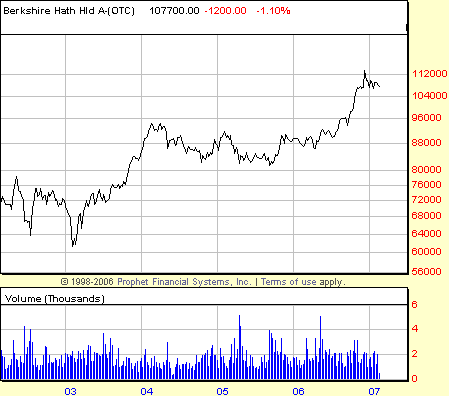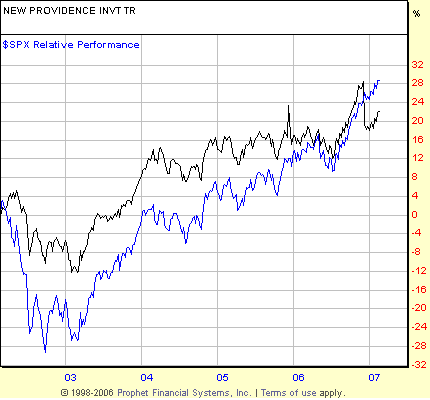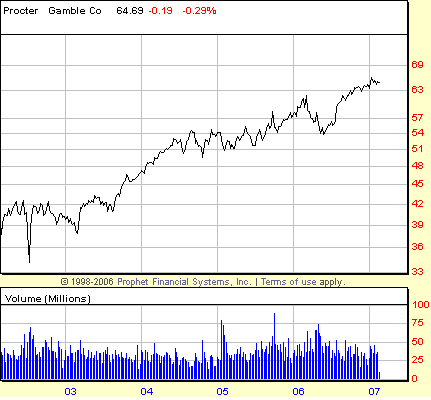
HOT TOPICS LIST
- Strategies
- Stocks
- Buy
- Investing
- Brokers
- Psychology
- Interviews
- Accumulate
- Sell
- Hold
- Spotlight
- Websites
- Candlestick Corner
- Gold & Metals
- Options Trading
LIST OF TOPICS
VIEWS FROM THE FIELD
Be Like Buffett
03/07/07 01:47:32 PM PSTby David Penn
For the past seven years, money manager Doug Davenport and The Wisdom Fund have offered investors a chance at investing in stocks "Warren's way."
| Young soccer players long to "bend it like Beckham." A generation of basketballers yearned to "be like Mike." And when it comes to investors, there is perhaps no more inspirational figure than the oracle of Omaha, Warren Buffett of Berkshire Hathaway. What is it that Warren Buffett has in terms of traits, habits, and investor style that many investors want to emulate? Compared to other famous/legendary investors like Peter Lynch and John Bogle, summing up Warren Buffett's investing style into a few words or a few handy maxims is not as easy as it might appear. While there are many truisms about investing attributed to Warren Buffett — often excerpts from interviews or copy lifted from the widely read annual reports from his chief investment vehicle, Berkshire Hathaway — there really is no blueprint or guide to investing in stocks "Warren's way." Even the books that have been published about Warren Buffett and Berkshire Hathaway over the years tend to provide a sense of the man and his work that is more historical or journalistic than the kind of primer an investor aspiring to Berkshire Hathaway success would need to put those aspirations in flight. We learn What Warren Did and Why Warren Did It. But does knowing how Warren Buffett concluded that Coca Cola was a good investment back in 1988 help us decide what soft-drink company (if any) investors should own right now? How does the average Jane or Joe Investor find the next Geico, or the next American Express, or the next See's Candy Shops? To make matters more complicated, many of Buffett's signature investments have been and continue to be in private companies with no publicly traded stock. Even if an investor could learn what needed to be known about a private company's fortunes, how in the world could average — or even above-average — investors get a piece of a privately held rock? Part of the problem in trying to emulate the performance of Berkshire Hathaway is that much of what Warren Buffett does as an investor is not a mystery to most investors. When authors like Robert Hagstrom, author of well-written books on Warren Buffett including The Essential Buffett: Timeless Principles For The New Economy, notes Buffett's insistence that he "invests in companies, not stocks," we hear not just the advice of the oracle of Omaha, but the more or less conventional wisdom of every fundamentally oriented investment guru from Benjamin Graham to Jim Cramer.
|
| That, of course, doesn't make the advice incorrect. But if everybody knows that investing in companies is more to the point than investing in stocks, then why isn't everything performing like Berkshire Hathaway (Figure 1)? Something similar could be said of the other main principles Hagstrom accurately derives from his analysis of Warren Buffett's investment style, such as "Demand a margin of safety for each purchase" and "Protect yourself from the speculative and emotional forces of the market." Sometimes the solution to a problem is so simple you wonder why people hadn't thought of it before. And in the instance of investors wanting to invest "the Warren Buffett way," the solution is not only simple but perhaps as effective and efficient as possible. If you want to invest like Warren Buffett, then why not just buy the stocks that Warren Buffett buys? Unlike traders, whose behavior in the market is often so short term that by the time you climb on board to "piggy back" a given trade, the trader has closed out the position and moved on to another one, the trait that makes Warren Buffett's investment style easy to track in some ways is the fact that he is very much an investor in the companies whose stocks he purchases. After all, even the most infrequent Buffett-watcher knows that the oracle of Omaha's favorite holding period for stocks is "forever." Fortunately, there may be an even surer route to Buffett-hood than chasing the oracle of Omaha's stock purchases, and that's by investing in a fund run by a manager who does that chase for you. Filed under "That makes so much sense why hasn't anyone else thought of it before," The Wisdom Fund, which is run by Douglas Davenport out of Atlanta, GA, has accurately and profitably tracked the investments of Berkshire Hathaway Holdings since its inception in the autumn of 1999. And given that The Wisdom Fund has often bested the Standard & Poor's 500, those looking for a mutual fund that might actually be a true buy & hold fund should consider whether an allocation to a Warren Buffett "tracking fund" might not be a wise move this year. NOT-SO-COMMON WISDOM Buffett's — and The Wisdom Fund's — abstinence was well rewarded. As Doug Davenport, portfolio manager of the fund, recalls, "We were going in the opposite direction" when tech stocks and the dotcoms blew up. Davenport notes that The Wisdom Fund bottomed in spring 2000 — mere months after the fund was launched — and it was up 8.5% from that time until October 2002, "while the S&P 500 was down 50%." See Figure 2.
|
| The idea behind launching a fund that would simply but accurately and intelligently track and mimic the purchases of Warren Buffett's Berkshire Hathaway was as simple and straightforward as the fund itself, says Davenport. A unique mutual fund that tracked Warren Buffett's investment purchases would be an easier investment for most people than just buying shares of Berkshire Hathaway (which was selling at a substantial premium in 1999, according to Davenport), and would also be simpler than trying to divine a specific formula out of Buffett's numerous interviews and the annual reports from Berkshire Hathaway. "By reading books [you] don't get any exact formula," Davenport observed. "[We] tried not to reinvent anything. Berkshire Hathaway is my research analyst." This is not to say that there isn't more to running The Wisdom Fund. In addition to attending Warren Buffett's famous annual conference, Davenport studies what could be called "proxy metrics" and research tools such as the Value Line investment survey (a favorite of Warren Buffett, not coincidentally), as well as free cash flow, net profit margins, and return on equity on the companies that Warren Buffett buys. This is all in addition to some of the intangible research he does, such as evaluating management. But Davenport's style in running The Wisdom Fund is still essentially to put on the Warren Buffett hat and ensure it has a good fit. That means not only adhering to some of the more mechanical aspects of investing like Warren Buffett, but also in taking to heart much of the spirit that animates Buffett's philosophy of participating in the markets. What does that philosophy entail? As far as Davenport is concerned, much of it can be summed up in an often-repeated remark from Warren Buffett himself, who has said that not only does he have no idea what the stock market is going to do, but also he wishes the market would close for 10 years. Why? Because at the end, as far as he is concerned, investing is about companies, not stocks. If you want to press the issue, it could be argued that the trick to investing is finding improving companies with "broken" stocks. "Home Depot is one recent example," Davenport notes, as were Coca Cola and Wal-Mart. These are companies with increased earnings per share, good dividends but, as Davenport acknowledges, the stock prices haven't gone anywhere. "The market is not focused on the great old companies," he says. What else has he gleaned from tracking and mimicking the investments of Warren Buffett over the past half-decade or so? Davenport urges investors not to rush, not to "hurry to put their money into the market." He uses the baseball metaphor of a batter in the batter's box to underscore the idea of waiting for the right pitch before taking a swing. In this he recalls the most important edge an investor (or a trader, for that matter) can have: the option to not invest at all. "Most people are way too impatient," Davenport observes. "They spend more time in trying to decide to buy a car than a stock." |
| THE WISDOM FUND WAY There's a lot to like about how The Wisdom Fund operates. The fund, which has kept pace with the S&P 500, has a relatively low turnover ratio of about 19% and, as such, the expenses are much lower with The Wisdom Fund than they are with many other mutual funds. The other advantage of investing in The Wisdom Fund as opposed to going out and trying to track Warren Buffett's stock purchases on your own is that by investing in a mutual fund, investors are likely to receive far better tax treatment with regard to capital gains — an advantage that also applies when compared to investing in shares of Berkshire Hathaway itself. One of the questions I had for Doug Davenport was how he and The Wisdom Fund handled private company acquisitions by Berkshire Hathaway. While many of the companies Berkshire Hathaway invests in are publicly traded, a number are not. So how does the fund provide its investors with exposure to these companies? The short answer is that The Wisdom Fund can't, if the companies involved are indeed private. But what Davenport does with the fund is to search out public companies that are as similar to the ones that Buffett has acquired shares in for Berkshire Hathaway. One example of this was Dairy Queen, the ice cream, sweets, and sandwiches fast-food restaurant acquired by Berkshire Hathaway in 1998. How did Davenport substitute for DQ? After careful research, he concluded that owning shares in companies like McDonalds and Yum! Brands (KFC, Taco Bell, Pizza Hut) would provide investors with the same kind of quality company and strong consistent growth that they would have owned in DQ. Davenport is also not above owning more than one stock in the same group, such as owning at one time shares in both Lowe's and Home Depot, or Coca Cola and Pepsi. Asked if given the fact that he from time to time has to come up with substitutes for privately held Berkshire Hathaway companies, he is ever tempted to second-guess the oracle of Omaha, Davenport stops and thinks about it for about five seconds before answering with a laugh that there have been times when he wished he owned stock A instead of stock B over a given period of time. But on balance, he and The Wisdom Fund have profited well simply by letting Buffett be Buffett (recall his confession that "Berkshire Hathaway is my research analyst") and letting The Wisdom Fund be The Wisdom Fund. There is plenty of room outside of the fund, in individual investments in stock or with other mutual funds, to experiment and speculate. Investors can get into trouble when they start trying to turn any specific investment strategy into a one-size-fits-all amalgam of every possible investment idea that might seem interesting at first blush. See Figure 3.
|
| That leads us to a fundamental point about investing, one that Davenport thinks is not only at the core of his stewardship of The Wisdom Fund, but also at the center of what makes investors like Warren Buffett so successful — knowing why you are investing in the first place. "Investing," says Davenport, "is a way to preserve capital and obtain a nice return on your money. It is not a way to become extremely wealthy." (Davenport recommends trying to start and operate your own business if "extreme wealth" is your goal.) "Try to preserve capital and get a return that is 3-5% above inflation for at least five years," he adds. It is a path well traveled by famous investors throughout history, to say nothing of the hundreds of thousands of anonymous investors who have taken this tortoise-like approach to growing the money they've already earned. As The Wisdom Fund states in a brief fund primer included in their third-quarter update: "We invest with a multi-year time horizon rather than focusing on the quarter ahead ... Buffett's style and ours does not limit the types of securities we will buy. It just limits what we will pay for them." And those are limits, portfolio-saving limits, within which every investor can and should learn to live. |
Technical Writer for Technical Analysis of STOCKS & COMMODITIES magazine, Working-Money.com, and Traders.com Advantage.
| Title: | Traders.com Technical Writer |
| Company: | Technical Analysis, Inc. |
| Address: | 4757 California Avenue SW |
| Seattle, WA 98116 | |
| Phone # for sales: | 206 938 0570 |
| Fax: | 206 938 1307 |
| Website: | www.traders.com |
| E-mail address: | DPenn@traders.com |
Traders' Resource Links | |
| Charting the Stock Market: The Wyckoff Method -- Books | |
| Working-Money.com -- Online Trading Services | |
| Traders.com Advantage -- Online Trading Services | |
| Technical Analysis of Stocks & Commodities -- Publications and Newsletters | |
| Working Money, at Working-Money.com -- Publications and Newsletters | |
| Traders.com Advantage -- Publications and Newsletters | |
| Professional Traders Starter Kit -- Software | |
PRINT THIS ARTICLE

Request Information From Our Sponsors
- StockCharts.com, Inc.
- Candle Patterns
- Candlestick Charting Explained
- Intermarket Technical Analysis
- John Murphy on Chart Analysis
- John Murphy's Chart Pattern Recognition
- John Murphy's Market Message
- MurphyExplainsMarketAnalysis-Intermarket Analysis
- MurphyExplainsMarketAnalysis-Visual Analysis
- StockCharts.com
- Technical Analysis of the Financial Markets
- The Visual Investor
- VectorVest, Inc.
- Executive Premier Workshop
- One-Day Options Course
- OptionsPro
- Retirement Income Workshop
- Sure-Fire Trading Systems (VectorVest, Inc.)
- Trading as a Business Workshop
- VectorVest 7 EOD
- VectorVest 7 RealTime/IntraDay
- VectorVest AutoTester
- VectorVest Educational Services
- VectorVest OnLine
- VectorVest Options Analyzer
- VectorVest ProGraphics v6.0
- VectorVest ProTrader 7
- VectorVest RealTime Derby Tool
- VectorVest Simulator
- VectorVest Variator
- VectorVest Watchdog



